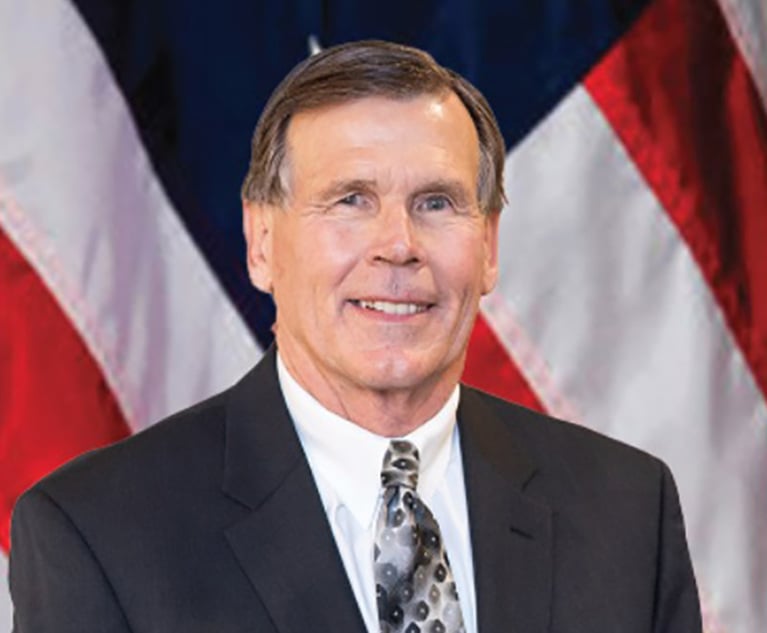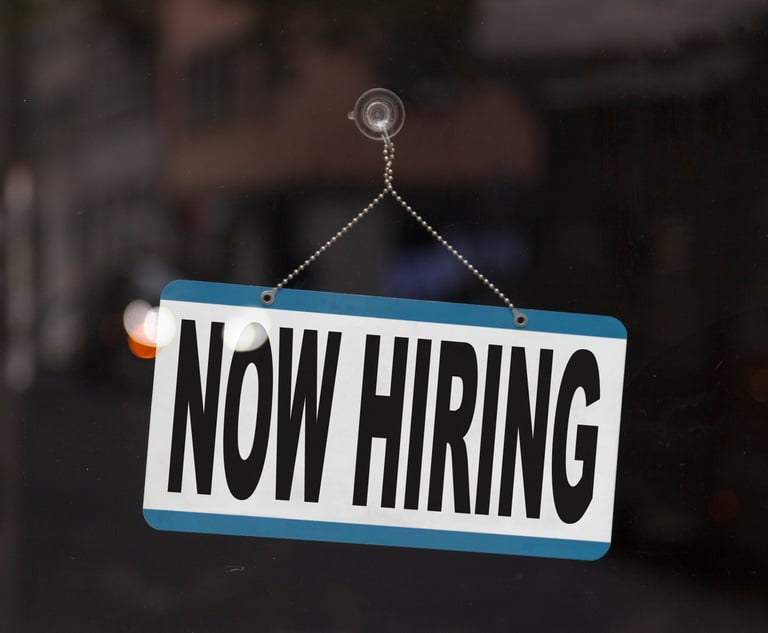Sotomayor Works the Room at Emory
Justice Sonia Sotomayor chuckled at how court members sometimes write in a decision, "The answer is clear." "If it was clear, there wouldn't be a split" in the circuit courts that led the high court to take the case in the first place, she said.
February 06, 2018 at 04:25 PM
3 minute read
 Justice Sonia Sotomayor, U.S. Supreme Court (Photo: John Disney / ALM)
Justice Sonia Sotomayor, U.S. Supreme Court (Photo: John Disney / ALM)
The late Justice William Brennan is said to have described the secret to success on the U.S. Supreme Court with one hand, five fingers outstretched, to show that, with five votes on a nine-member court, a justice could do anything.
Justice Sonia Sotomayor suggested a similar approach when she told a packed Emory University audience Tuesday how she handles harsh criticism of her opinions. Of colleagues who have occasionally blasted one of her positions, she said, “I could have strangled them, but I need their vote for the next case.”
“You have to be able to reach compromise,” she said as she worked her way around the pews of the 1,200-seat Glenn Auditorium. Throughout the 60-minute event, she shook hands and offered hellos and hugs to judges, law students and a few children in the audience. (“I don't like to sit still,” she said.)
“Reasonable people can disagree,” she said a couple of times, chuckling at how court members sometimes write in a decision, “The answer is clear.”
“If it was clear, there wouldn't be a split” in the circuit courts that led the high court to take the case in the first place, she said.
Sotomayor largely steered clear of hot button topics in her conversation with one of her former law clerks, Fred Smith Jr., who now teaches constitutional law at Emory.
Asked why she wrote her memoir, “My Beloved World,” Sotomayor said she wanted “to identify those things that made me who I am.”
“Have you ever heard titans of business who talk about being self-made?” she asked, prompting laughter from the audience. “All of us have people who supported and guided us.”
Smith asked if the justice had ever felt like an outsider, and she responded, “Most of my life.” Growing up with diabetes, coming from a poor family to attend Princeton University and fighting for more Latino administrators at the school all left her with a sense of not belonging, she said.
She advised anyone who feels the same way to remember, “I may not belong 100 percent, but I'm there.”
Although Sotomayor is a fierce advocate for gender, racial and ethnic diversity and has drawn attention for being the first Latina to serve on the high court, she told one student that she is more concerned these days about a dearth of differing experiences on the bench.
Every justice went to an Ivy League school, she said, and the justices' religious backgrounds used to be only Catholic and Jewish, now with one Protestant. Only Justice Anthony Kennedy has any experience as a criminal defense attorney, and that involves only a handful of cases. She is the only justice with any experience as a state prosecutor. And no justice has any experience in immigration or environmental law, she added as examples.
“I worry more about that now,” she added.
As she continued to wander the room, Sotomayor stopped before a pair of grade-school- age girls in the front row and said, “Nobody should live their life as a bystander.”
Offering a hug, she said, “You're going to do bigger things than me.”
This content has been archived. It is available through our partners, LexisNexis® and Bloomberg Law.
To view this content, please continue to their sites.
Not a Lexis Subscriber?
Subscribe Now
Not a Bloomberg Law Subscriber?
Subscribe Now
NOT FOR REPRINT
© 2025 ALM Global, LLC, All Rights Reserved. Request academic re-use from www.copyright.com. All other uses, submit a request to [email protected]. For more information visit Asset & Logo Licensing.
You Might Like
View All


Federal Court Rejects Plaintiff's Attempt to Amend Claims Against Weapons Manufacturer
Trending Stories
- 1Tensions Run High at Final Hearing Before Manhattan Congestion Pricing Takes Effect
- 2Improper Removal to Fed. Court Leads to $100K Bill for Blue Cross Blue Shield
- 3Michael Halpern, Beloved Key West Attorney, Dies at 72
- 4Burr & Forman, Smith Gambrell & Russell Promote More to Partner This Year
- 5Sanctions Order Over Toyota's Failure to Provide English Translations of Documents Vacated by Appeals Court
Who Got The Work
Michael G. Bongiorno, Andrew Scott Dulberg and Elizabeth E. Driscoll from Wilmer Cutler Pickering Hale and Dorr have stepped in to represent Symbotic Inc., an A.I.-enabled technology platform that focuses on increasing supply chain efficiency, and other defendants in a pending shareholder derivative lawsuit. The case, filed Oct. 2 in Massachusetts District Court by the Brown Law Firm on behalf of Stephen Austen, accuses certain officers and directors of misleading investors in regard to Symbotic's potential for margin growth by failing to disclose that the company was not equipped to timely deploy its systems or manage expenses through project delays. The case, assigned to U.S. District Judge Nathaniel M. Gorton, is 1:24-cv-12522, Austen v. Cohen et al.
Who Got The Work
Edmund Polubinski and Marie Killmond of Davis Polk & Wardwell have entered appearances for data platform software development company MongoDB and other defendants in a pending shareholder derivative lawsuit. The action, filed Oct. 7 in New York Southern District Court by the Brown Law Firm, accuses the company's directors and/or officers of falsely expressing confidence in the company’s restructuring of its sales incentive plan and downplaying the severity of decreases in its upfront commitments. The case is 1:24-cv-07594, Roy v. Ittycheria et al.
Who Got The Work
Amy O. Bruchs and Kurt F. Ellison of Michael Best & Friedrich have entered appearances for Epic Systems Corp. in a pending employment discrimination lawsuit. The suit was filed Sept. 7 in Wisconsin Western District Court by Levine Eisberner LLC and Siri & Glimstad on behalf of a project manager who claims that he was wrongfully terminated after applying for a religious exemption to the defendant's COVID-19 vaccine mandate. The case, assigned to U.S. Magistrate Judge Anita Marie Boor, is 3:24-cv-00630, Secker, Nathan v. Epic Systems Corporation.
Who Got The Work
David X. Sullivan, Thomas J. Finn and Gregory A. Hall from McCarter & English have entered appearances for Sunrun Installation Services in a pending civil rights lawsuit. The complaint was filed Sept. 4 in Connecticut District Court by attorney Robert M. Berke on behalf of former employee George Edward Steins, who was arrested and charged with employing an unregistered home improvement salesperson. The complaint alleges that had Sunrun informed the Connecticut Department of Consumer Protection that the plaintiff's employment had ended in 2017 and that he no longer held Sunrun's home improvement contractor license, he would not have been hit with charges, which were dismissed in May 2024. The case, assigned to U.S. District Judge Jeffrey A. Meyer, is 3:24-cv-01423, Steins v. Sunrun, Inc. et al.
Who Got The Work
Greenberg Traurig shareholder Joshua L. Raskin has entered an appearance for boohoo.com UK Ltd. in a pending patent infringement lawsuit. The suit, filed Sept. 3 in Texas Eastern District Court by Rozier Hardt McDonough on behalf of Alto Dynamics, asserts five patents related to an online shopping platform. The case, assigned to U.S. District Judge Rodney Gilstrap, is 2:24-cv-00719, Alto Dynamics, LLC v. boohoo.com UK Limited.
Featured Firms
Law Offices of Gary Martin Hays & Associates, P.C.
(470) 294-1674
Law Offices of Mark E. Salomone
(857) 444-6468
Smith & Hassler
(713) 739-1250







